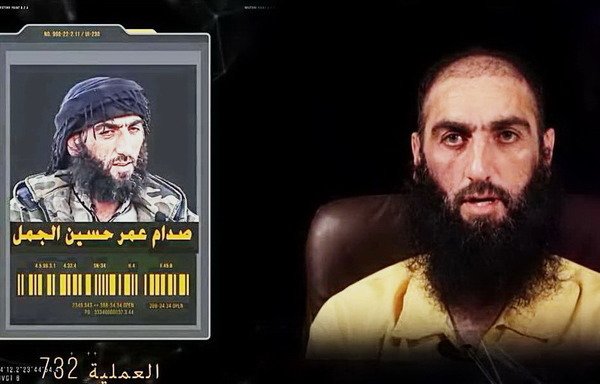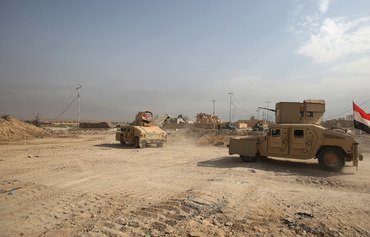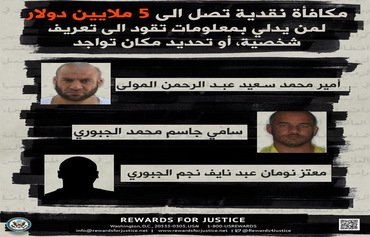With the recent capture of five senior "Islamic State of Iraq and Syria" (ISIS) commanders, Iraqi forces have succeeded in penetrating Abu Bakr al-Baghdadi's inner circle are close to flushing him out of hiding.
On May 11th, Iraq announced that its national intelligence services had conducted a “high level operation" in collaboration with the Joint Operations Command, on the directive of Prime Minister Haider al-Abadi.
The sting operation, code-name "732", is the biggest of its kind in the past four years, and began with the capture of 55-year-old Ismail Alwan Salman al-Ithawi, who goes by the alias Abu Zaid al-Iraqi, officials told Diyaruna.
The Ramadi native served as the group's “Minister of Fatwa”, supervised the appointment of “walis and emirs” and assessed the educational curricula.
![Iraqi intelligence services lured ISIS leaders Ismail Alwan Salman al-Ithawi (clockwise from top left), Issam Abdul Qadir Ashour al-Zawbaie, Omar Shihab Hamad al-Karbouli and Mohammed Hussain Hadhar to Iraq by sending them a message on the cell phone of a captured ISIS leader. [Screenshot from video]](/cnmi_di/images/2018/05/25/12728-ISIS-leaders-captured-600_384.jpg)
Iraqi intelligence services lured ISIS leaders Ismail Alwan Salman al-Ithawi (clockwise from top left), Issam Abdul Qadir Ashour al-Zawbaie, Omar Shihab Hamad al-Karbouli and Mohammed Hussain Hadhar to Iraq by sending them a message on the cell phone of a captured ISIS leader. [Screenshot from video]

Syrian ISIS leader Saddam Omar Hussain al-Jamal, alias Abi Ruqaya al-Ansari, is accused of taking part in the burning alive of a Jordanian pilot and in massacring hundreds of members of al-Shaitat tribe in 2015. Al-Iraqiya television broadcast his confessions on May 9th.
He was arrested on February 15th during a joint operation of the Iraqi intelligence services, Turkish security services and the international coalition, extremist groups expert Hashim al-Hashimi told Diyaruna.
The Turkish Ministry of Foreign Affairs on May 11th said his capture came thanks to the work of “the intelligence services and the police in Skaria province in western Turkey”.
Turkey “is deploying all its capabilities to fight ISIS”, the ministry said, noting that “working together at the international level is yielding significant results”.
ISIS leaders lured into a trap
After his capture, al-Ithawi was extradited to Iraq for interrogation.
Using his cell phone, Iraqi intelligence services managed to lure four top ISIS commanders from Syria by sending a message, purportedly from al-Ithawi, instructing them to come immediately to Iraq.
They walked into the trap.
They include Mohammed Hussain Hadhar, a Syrian who goes by the alias Abu Saif al-Shaeeti, who used to serve as "emir" of the Syrian city of al-Mayadeen.
Issam Abdul Qadir Ashour al-Zawbaie, an Iraqi also known as Abu Abdul Haq al-Iraqi and Abdul Haq al-Humam, was emir of al-Fatah al-Dhariba brigade; while fellow Iraqi Omar Shihab Hamad al-Karbouli, alias Abu Has al-Karbouli, was an "intelligence operative" of the so-called Wilayat al-Furat (Euphrates Province).
The most dangerous of the four was a 39-year-old Syrian named as Saddam Omar Hussain al-Jamal, alias Abi Ruqaya al-Ansari, who is a native of Albu Kamal and served as "security official" of ISIS's Wilayat al-Furat.
He is accused of taking part in the burning alive of a Jordanian pilot, Moaz al-Kasabeh, three years ago, and in massacring hundreds of members of the Syrian al-Shaitat tribe in the summer of 2015.
Al-Iraqiya television channel on May 9th broadcast footage of al-Jamal’s confessions, in which he confirmed there were “divisions and conflict within the group and that “many elements are staying put and do not want to fight”.
'Most important development'
The capture of these five is "the biggest and most important development since the start of the war” on ISIS in the summer of 2014, al-Hashimi said.
Al-Baghdadi “is very close to either being killed or captured”, he said, explaining that “this is not merely a debilitating blow to ISIS. It will crush the group”.
The operation was "carefully planned" and dealt ISIS a heavy blow, Joint Operations Command spokesman Brig. Gen. Yahya Rasul told Diyaruna.
Intelligence efforts to hunt down and target the remaining ISIS leaders and elements are ongoing, he said, noting that “our airstrikes in Syria have destroyed several of their headquarters and bomb-making factories”.
An April 19th Iraqi Air Force strike that hit an ISIS building in Hajeen in Syria's Deir Ezzor province, killing around 40 senior leaders, was a result of information obtained from the confessions of the five ISIS leaders, he said.
Al-Baghdadi’s end is imminent as a result of the “high level targeting” of his closest commanders, Rasul said.
This shows the group and its leader have been weakened, Ninawa provincial council security committee chairman Hassan Shabeeb told Diyaruna, noting that it has become clear the group's front line commanders have been compromised.
“From an organisational perspective, the terrorists are finished," he said. "Their bloody ideology is now being heavily rejected by locals who cannot stand them anymore after all the destruction they caused."

![An Iraqi man holds printed profiles of ISIS leader Abu Bakr al-Baghdadi released by Iraqi authorities on February 6th. Iraqi forces recently breached the ISIS leader's inner circle with the recent capture of five of his senior commanders. [Ahmad al-Rubaye/AFP]](/cnmi_di/images/2018/05/25/12729-Baghdadi-wanted-poster-600_384.jpg)






Despite success, ISIS elements are still there; in Mosul and Erbil. They aren't detained.
Reply4 Comment(s)
Those who live only for themselves didn’t deserve to be born. The above phrase is valuable and worthy of all pride and appreciation. What happened to our people in Mosul in previous years is well known. Mosul has witnessed a calamity which it hadn’t been through for a whole decade. The story started on Monday, June 9th 2014 when the group which knows nothing about humanity entered Mosul. This led to the destruction of many mosques, churches, temples and monuments. At that time, the people of Mosul couldn’t defend their city as they were helpless and powerless. Because of those mean-spirited people who supported the "Islamic State of Iraq and Syria" (ISIS) in those years, the city lived black days in which the blood of innocent people were spilled. When the start of [liberation] operations was announced, the people of Mosul showed solidarity and compassion with each other, sharing water and food, although these items were scarce. As to ISIS elements, they didn’t care that people ate only flour, while they ate the most delicious beef and other foods. As some areas of Mosul were liberated by the security forces, who sacrificed everything including their own blood because they deserved to be born, groups of young men started to form volunteer teams. Such teams cleaned the city, distributed assistance and extended a lending hand to their people. More groups appeared that raised the levels of education. Such groups were called ‘free lecturers’, and most of their members worked
Reply4 Comment(s)
O, God, give victory to our holy army and forces.
Reply4 Comment(s)
O, God, give victory to our security forces!
Reply4 Comment(s)